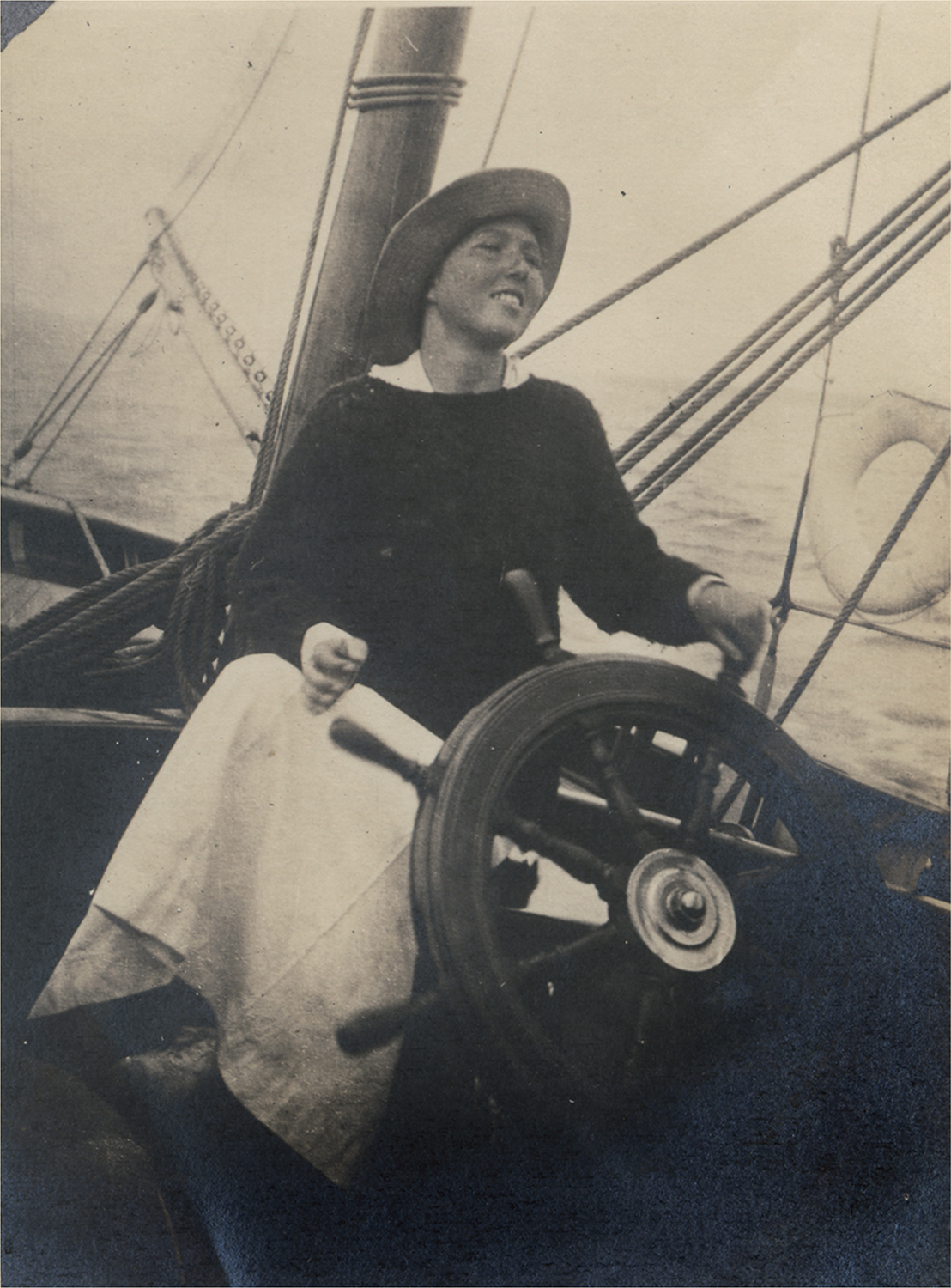The American Promise:
Printed Page 626
Chapter Chronology
SEEKING THE AMERICAN PROMISE
Seeking to Serve: An American Woman in Wartime France

Nora Saltonstall Seen here at the wheel of the yawl Comanche off the coast of Maine, Nora Saltonstall grew into a self-assured, adventurous woman. Although no rebel (she wasn’t a suffragist, for example), she was certain that she had something to offer to America’s war effort. Unlike most Americans who arrived in Paris during the war, she had already spent a year studying art and history while touring Europe. © Massachusetts Historical Society, Boston, MA, USA/The Bridgeman Art Library.
When World War I broke out in Europe in 1914, nineteen-year-old Nora Saltonstall was vacationing in Maine with other wellborn young people. A daughter of privilege, she belonged to one of Massachusetts’s most distinguished families. But she was no silly, idle debutante. The Saltonstalls instilled in their children a strong sense of the obligation to serve. Within months, she was rolling bandages for the Red Cross in Boston and raising money for the relief of Belgian refugees. By the time the United States entered the war in April 1917, her two Harvard-educated brothers had already volunteered for military service. In October 1917, she volunteered for Red Cross work in France.
After an eleven-day voyage across the submarine-infested Atlantic, Saltonstall arrived in Bordeaux without any idea what she would be doing. She was assigned to long hours of dull work in Paris finding housing for refugees, and like many other American women in France, she contracted “frontline fever,” an obsession with getting as far forward in the war zone as she could. She longed for what she called a “man’s size job,” something that would test her mettle and contribute to victory.
By January 1918, Saltonstall had found “real work,” which would be “a direct help, even if it is the tiniest drop in the bucket.” She joined a group of female Red Cross volunteers attached to a mobile surgical hospital that followed closely behind the French armies. Lacking training as a nurse, she became the unit’s driver, responsible for chauffeuring personnel, transporting the wounded, and hauling supplies as the unit moved from place to place. Soon she was driving on muddy, shell-pocked roads in the dark without lights. She also became a mechanic, with the responsibility for maintaining and repairing the vehicles. “I usually cover myself with grease and oil every morning, tinker about a bit and do more harm than good,” she wrote home shortly after arriving. But before long, she announced proudly, “I fixed the steering shaft on the Ford all by myself.” Her life, she told her mother, consisted of “choked carburetors, broken springs, long hours on the road, food snatched when you can get it, and sleep.” Her work brought changes. “I have developed a most enormous muscle in my right arm, and I am really rather ashamed of it because it literally stands out.” She joked, “I’ll have to try to direct it into a tennis stroke after the war.”
But Saltonstall’s sense of humor was tested by the death and destruction she confronted every day. The “stream of wounded men and refugees still makes me ache,” she said. “I never hated the war so much before. I have seen enough wounds to hate them, and I don’t see how people who have been in it for 3½ years can bear up at all, just one long unending hashing up of people.” She lived, she said, in an “insane asylum.”
At the same time, she never felt more alive. She believed that she was “learning more . . . than I could learn in years of regular living at home.” Saltonstall loved being in the thick of things and “at last feeling as if I were doing something necessary here.” She felt proud: “Because we are here, work is being done better and lives saved which might otherwise have been lost. . . . I love my job.” She never expressed regrets about coming to France: “If I had not come over I would have felt not to have belonged to this generation and would have felt all my life as if there were something lacking to me on a level with all the up and coming crowd of my own age.” Of this she was certain: “After the war there is going to be a difference between those who were in France and those not.”
In November 1918, after nearly a year at the front, she scribbled in her diary: “Great excitement, guns stopped firing at midnight. Peace in the air.” She celebrated the armistice with the others, but she also realized that her great adventure was almost over. She contemplated her return to the ordinariness of her civilian life: “I wonder when I get to Boston whether I will ever have the courage to motor 80 miles to a party, arrive at midnight, dance until 5 A.M. and then after a wonderful lunch and supper, motor back the next evening.” Demobilization left her with a “very flat feeling.” In December, the French government decorated Nora and her unit with the Croix de Guerre for their courageous service, and in March 1919 she sailed for home. Nora Saltonstall never got to confront her concerns about reentering American life, however. Just months after returning, on a camping trip in the West, she contracted typhoid fever and died.
Questions for Consideration
- How did Nora Saltonstall’s gender shape her wartime service? How was her experience different from or similar to that of George “Brownie” Browne?
- Despite the blood and gore of the battlefield, Saltonstall found her service in France satisfying. Why?
Considering domestic developments during and just after the war (discussed later in this chapter), do you think that Saltonstall’s worries about life in America after the war were justified? Why or why not?
